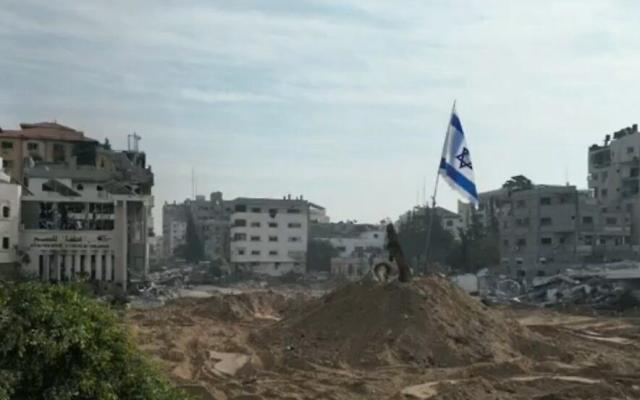In a significant strategic maneuver, the Israeli Defense Forces (IDF) announced the successful capture of Palestine Square in Gaza City, a pivotal stronghold of Hamas. IDF spokesperson Daniel Hagari detailed this achievement on Sunday, underscoring the importance of the location, which houses the office of Yahya Sinwar, Hamas' leader in the Gaza Strip. This operation is part of a broader Israeli strategy to dismantle Hamas' influence and military capabilities in the region.
The IDF's operation extends beyond Palestine Square, targeting several Hamas bases across Gaza, including Khan Younis in the south and Jabalia in the north. These efforts are part of Israel's determined mission to locate Sinwar, who remains elusive.
"On Sunday night, IDF's Hagari declared that the IDF had completed its takeover of Palestine Square in the heart of Gaza City. He said: “Palestine Square is where Yahya Sinwar’s office is located, it is where government offices are located... https://t.co/cHzhWeMBQV
— Anthony Glees @anthonyglees.bsky.social (@AnthonyGlees) December 11, 2023
In a bold counter-claim, Hamas asserted its resilience, claiming the destruction of 44 Israeli military vehicles over the last 48 hours. This claim, however, stands in contrast to the strategic successes of the IDF in the region.
In a parallel psychological warfare front, the Israeli security agency Shin Bet released an interrogation video of a former senior Gaza official from 2007. The video reveals a critical denunciation of Hamas leadership, portraying them as "crazy people" under Sinwar's direction. Israeli Prime Minister Benjamin Netanyahu further intensified this psychological pressure, urging Hamas fighters to surrender in a video released on Sunday. These efforts are seen as tactical moves to destabilize Hamas' morale and internal cohesion.
Israeli flag proudly flies in 'Palestine Square's at the heart of Gaza City at Sunrise. Photo: Yigal Slavin #Israel #Gaza https://t.co/t816VeqnGN
— Eli Dror (@edrormba) December 10, 2023
Despite these successes, Israel mourns the loss of its soldiers, with four new casualties reported on Monday, bringing the nation's toll to over 100 since the ground operation commenced. This figure reflects the high cost Israel is willing to bear in its pursuit of security and peace.
The conflict has also taken a heavy toll on Gaza's civilian population. The Hamas-run Health authorities report approximately 18,000 casualties since the fighting began. These figures, however, are difficult to verify independently, and Israel maintains that its operations are targeted and aimed at minimizing civilian casualties.
The humanitarian situation in Gaza is worsening, with the WHO highlighting the collapse of the health system. The ongoing conflict has made aid delivery increasingly challenging, further exacerbating the crisis.
Hamas terrorists slaughtered innocent children, kidnapped them, and abused them. IDF soldiers took care of a girl in Gaza who needed treatment, made sure she had food, and that she returned home safe and sound. This is the difference between us and them! pic.twitter.com/FBo0MdsAoF
— יוסף חדאד - Yoseph Haddad (@YosephHaddad) December 11, 2023
In a concerning development, it was reported that up to 40 UNRWA installations have been hit since the conflict's onset. These incidents have resulted in the deaths of at least 284 people seeking shelter and injuring nearly a thousand. Israel has presented substantial evidence suggesting that these facilities were utilized by Hamas and other terror groups, indicating that many casualties might be combatants. This narrative, however, is often overshadowed by portrayals of these incidents as attacks on innocent civilians.
The death of a UNRWA staff member on December 9 brings the total number of agency-related fatalities to 134. Notably, the initial UNRWA employees killed were part of Hamas squads that infiltrated Israel on October 7th. This aspect, often omitted in UN reports, underscores the complex and intertwined nature of the conflict, where lines between combatants and civilians are blurred.
The blue flag is another form of Hamas flag. Most if not all UNRWA facilities are or were Hamas military positions. Many of UNRWA workers are Hamas activists. UNRWA schools are factories of Jews hate and incitement for death. UNRWA has responsibility for the catastrophe. https://t.co/ZQvFOSQycQ
— 🇮🇱🇺🇦 Brandeis (@lYtyU1BehDpkfch) December 11, 2023
As Israel continues its operations, the focus remains on neutralizing threats to its security, while the international community grapples with the urgent need for a sustainable solution to the humanitarian crisis in Gaza. The Israeli military's strategic gains are viewed as crucial steps towards ensuring long-term peace and stability in the region, even as the path forward remains fraught with challenges.


